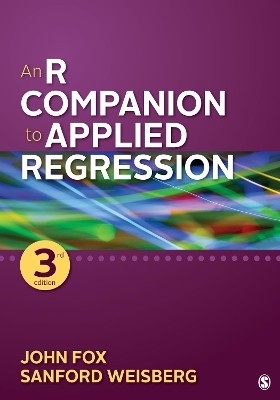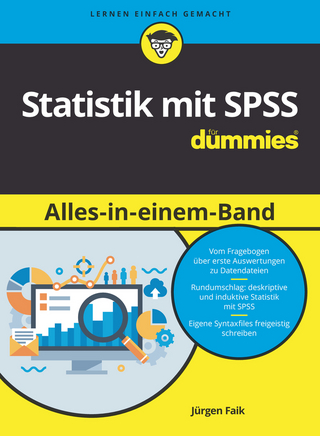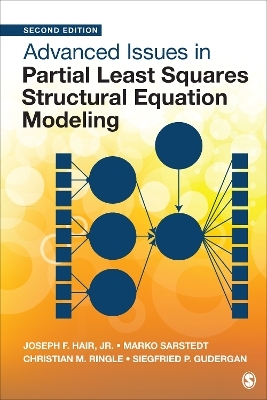
An R Companion to Applied Regression
SAGE Publications Inc (Verlag)
978-1-5443-3647-3 (ISBN)
An R Companion to Applied Regression is a broad introduction to the R statistical computing environment in the context of applied regression analysis. John Fox and Sanford Weisberg provide a step-by-step guide to using the free statistical software R, an emphasis on integrating statistical computing in R with the practice of data analysis, coverage of generalized linear models, and substantial web-based support materials. The Third Edition has been reorganized and includes a new chapter on mixed-effects models, new and updated data sets, and a de-emphasis on statistical programming, while retaining a general introduction to basic R programming. The authors have substantially updated both the car and effects packages for R for this edition, introducing additional capabilities and making the software more consistent and easier to use. They also advocate an everyday data-analysis workflow that encourages reproducible research. To this end, they provide coverage of RStudio, an interactive development environment for R that allows readers to organize and document their work in a simple and intuitive fashion, and then easily share their results with others. Also included is coverage of R Markdown, showing how to create documents that mix R commands with explanatory text.
"An R Companion to Applied Regression continues to provide the most comprehensive and user-friendly guide to estimating, interpreting, and presenting results from regression models in R."
–Christopher Hare, University of California, Davis
John Fox received a BA from the City College of New York and a PhD from the University of Michigan, both in Sociology. He is Professor Emeritus of Sociology at McMaster University in Hamilton, Ontario, Canada, where he was previously the Senator William McMaster Professor of Social Statistics. Prior to coming to McMaster, he was Professor of Sociology, Professor of Mathematics and Statistics, and Coordinator of the Statistical Consulting Service at York University in Toronto. Professor Fox is the author of many articles and books on applied statistics, including /emph{Applied Regression Analysis and Generalized Linear Models, Third Edition} (Sage, 2016). He is an elected member of the R Foundation, an associate editor of the Journal of Statistical Software, a prior editor of R News and its successor the R Journal, and a prior editor of the Sage Quantitative Applications in the Social Sciences monograph series. Sanford Weisberg is Professor Emeritus of statistics at the University of Minnesota. He has also served as the director of the University′s Statistical Consulting Service, and has worked with hundreds of social scientists and others on the statistical aspects of their research. He earned a BA in statistics from the University of California, Berkeley, and a Ph.D., also in statistics, from Harvard University, under the direction of Frederick Mosteller. The author of more than 60 articles in a variety of areas, his methodology research has primarily been in regression analysis, including graphical methods, diagnostics, and computing. He is a fellow of the American Statistical Association and former Chair of its Statistical Computing Section. He is the author or coauthor of several books and monographs, including the widely used textbook Applied Linear Regression, which has been in print for almost forty years.
1. Getting Started with R and RStudio
Projects in RStudio
R Basics
Fixing Errors and Getting Help
Organizing Your Work in R and RStudio
An Extended Illustration
R Functions for Basic Statistics
Generic Functions and Their Methods*
2. Reading and Manipulating Data
Data Input
Managing Data
Working With Data Frames
Matrices, Arrays, and Lists
Dates and Times
Character Data
Large Data Sets in R*
Complementary Reading and References
3. Exploring and Transforming Data
Examining Distributions
Examining Relationships
Examining Multivariate Data
Transforming Data
Point Labeling and Identication
Scatterplot Smoothing
Complementary Reading and References
4. Fitting Linear Models
The Linear Model
Linear Least-Squares Regression
Predictor Effect Plots
Polynomial Regression and Regression Splines
Factors in Linear Models
Linear Models with Interactions
More on Factors
Too Many Regressors*
The Arguments of the lm Function
Complementary Reading and References
5. Standard Errors, Confidence Intervals, Tests
Coefficient Standard Errors
Confidence Intervals
Testing Hypotheses About Regression Coefficients
Complementary Reading and References
6. Fitting Generalized Linear Models
The Structure of GLMs
The glm() Function in R
GLMs for Binary-Response Data
Binomial Data
Poisson GLMs for Count Data
Loglinear Models for Contingency Tables
Multinomial Response Data
Nested Dichotomies
The Proportional-Odds Model
Extensions
Arguments to glm()
Fitting GLMs by Iterated Weighted Least-Squares*
Complementary Reading and References
7. Fitting Mixed-Effects Models
Background: The Linear Model Revisited
Linear Mixed-Effects Models
Generalized Linear Mixed Models
Complementary Reading
8. Regression Diagnostics
Residuals
Basic Diagnostic Plots
Unusual Data
Transformations After Fitting a Regression Model
Non-Constant Error Variance
Diagnostics for Generalized Linear Models
Diagnostics for Mixed-Effects Models
Collinearity and Variance-Inflation Factors
Additional Regression Diagnostics
Complementary Reading and References
9. Drawing Graphs
A General Approach to R Graphics
Putting It Together: Local Linear Regression
Other R Graphics Packages
Complementary Reading and References
10. An Introduction to R Programming
Why Learn to Program in R?
Defining Functions: Preliminary Examples
Working With Matrices*
Conditionals, Loops, and Recursion
Avoiding Loops
Optimization Problems*
Monte-Carlo Simulations*
Debugging R Code*
Object-Oriented Programming in R*
Writing Statistical-Modeling Functions in R*
Organizing Code for R Functions
Complementary Reading and References
| Erscheinungsdatum | 13.10.2018 |
|---|---|
| Verlagsort | Thousand Oaks |
| Sprache | englisch |
| Maße | 177 x 254 mm |
| Gewicht | 1120 g |
| Themenwelt | Mathematik / Informatik ► Mathematik ► Computerprogramme / Computeralgebra |
| Sozialwissenschaften ► Soziologie ► Allgemeines / Lexika | |
| ISBN-10 | 1-5443-3647-0 / 1544336470 |
| ISBN-13 | 978-1-5443-3647-3 / 9781544336473 |
| Zustand | Neuware |
| Informationen gemäß Produktsicherheitsverordnung (GPSR) | |
| Haben Sie eine Frage zum Produkt? |
aus dem Bereich


